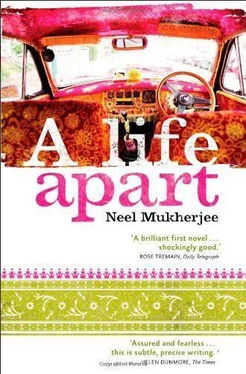A whole town going self-consciously, safely mad because it was expected of it.
Gavin is very busy. Ritwik has hardly seen him this term. He leaves notes outside Gavin’s door; a few days later he finds one Gavin has BluTacked on to his. It says how he has been working until two in the morning at the studio and returning there at eight in the morning: the final lap in putting together the degree show is consuming him. But they could meet for a quick tea in his rooms next Sunday afternoon? Yes, writes Ritwik, and sticks the note under the door. He feels both eagerness and apprehension about Sunday — he needs to ask Gavin a few things but he doesn’t hope for many answers. Gavin will probably divert it to being facetious and clever-clever.
The cottaging rages like a hectic in Ritwik’s blood. It is a habit, an addiction, and he is powerless to break out of its grip. But he hasn’t even tried. The pangs of guilt — I waste so much time down there, I could use it for revision, for plain sleeping, or cracking Vindication of the Rights of Women — are always mollified, suppressed, or dismissed. So far no one has justified the long waits. Ritwik is beginning to realize that this is the way it is going to be, that no one will come along to save him, but he has the clinical gambler’s dopamine-addicted brain, hooked to the tyranny of uncertain and random rewards.
On nights when the sound of footfalls becomes few and far between, sometimes dwindling to nothing for hours, he sits there and thinks of his mother and the lost innocence of the word ‘abuse’. The English he has grown up with in India is slightly different from England English; there is a touch of a phase-lag somewhere — they do not superimpose on each other perfectly. ‘Abuse’ for Ritwik has always meant the hurling of loud, angry, possibly filthy words at someone else — you can call someone a motherfucking bastard and that would be abuse. But to have it upgraded like this, in the casual snap of two fingers, to his entire childhood, to his relationship with a mother who is not there anymore to answer questions or even to listen to him — no, that can’t be right. And surely this has happened, more or less, to every child in India? He feels a sudden rush of irritation for this business of other cultures, other countries, renaming and recategorizing things, using their own yardsticks, for other people, as if their definitions were universal. But this fades away as swiftly as it has arrived with the question, ‘What if they’re right?’ The momentousness of the answer is always kept at bay by that classic reasoning: it happens to other people, not to me. He hasn’t got his head fully around the cognitive shift ‘abuse’ has undergone.
At other times he just sits away the hours in his cubicle thinking, ‘What would you think if you saw me now? This , this stench of urine and disinfectant and cock, this is what I am, not what you wanted me to be.’ And he punishes her more by staying on another extra hour when he knows there won’t be anyone else visiting the public toilets that night.
It could be any night, it i s any night, because they are all the same, they all wind down the same way, but not this one. Four pints of Guinness in the college bar, followed by two pipes of hash in Chris Elwes’s room, have left Ritwik clouded and dizzy. He can’t sit still or lie down for more than a few seconds because everything starts becoming gently, dancingly unstuck and unfixed. The only hope is to keep walking. So he walks down a deserted Banbury Road, northwards, to his dorm on Staverton Road. At this time there are no cars, no people, no bicycles, just a long, well-lit stretch of road with trees on either side dropping blossom intermittently on to the tarmac. The traffic and pelican-crossing lights are desolate; they blink and change for no one at all to the rhythm of some soulless programme they are wired to.
A red car pulls up a few yards in front of him and the passenger door opens. No one gets out. By the time Ritwik arrives next to the passenger door, the driver has lowered his head and is leaning sideways to look at him. He is not thinking, there is a vague feeling somewhere that the driver knows him and is trying to give him a lift. Maybe it is one of the students who lives in his annexe. He gets in, does up the seat belt, slurs out the name of his destination and only then manages to loll his head driverwards to look at him. No, he doesn’t know him, but he is nice-looking, nicely aged, a handsome uncle or maybe even a father who’ll take care of him. There is a benign smile somewhere behind those thin lips, waiting to break out. Only when the car picks up speed does Ritwik notice that the man hasn’t spoken at all, or even asked for directions; in fact, he seems to know where they are headed. Ritwik tries to focus but it is too much of an effort. The motion of the car moving smoothly doesn’t do him any good: he longs to move around so that he can keep the imminent sickness at bay.
The man takes the correct left turn, drives into the college annexe — he sure knows the place — parks and turns off the engine.
When Ritwik speaks, what comes out is a slew of words run together, ‘J’yoowannoo come up?’
The man nods, pockets his keys and follows Ritwik who is already making his way up the stairs, as stealthily and as silently as he can. He doesn’t really need to — there is no one awake at this time. He turns around and puts a finger to his lips, indicating to the man to be quiet. The man nods.
Ritwik tiptoes down his corridor. His is the second room on the left; there are four on either side of the narrow, fluorescent-lit corridor. He opens his door noiselessly — he is surprised he doesn’t fumble with the key and the Yale lock — and steps in. The man follows. There is enough diffused light in the room from the car park outside so he doesn’t bother turning on the light or drawing the curtains. He starts taking his shoes and clothes off. The man does likewise, almost mimicking him: first the shoes and socks, then the jacket, the T-shirt, the trousers. They both leave their underwear on.
Ritwik gets into bed and slips under the duvet. The stranger sits on the edge of the bed and takes him in for a while, his face in the refracted orange glow of the room a chiselled piece of shadows. He too gets under the duvet and stretches himself along the entire length of Ritwik, their bodies touching at every possible point. The man’s body next to him is all silk and warm honey. And then it hits Ritwik.
The wave, which had been building up for such a long time, which he had managed to avoid so far, now suddenly grabs him up and hurls him against an invisible wall. The whole room spins and nausea crashes all over him.
He tries to lie curled up; his head in the crook of his arm, his eyes shut, and wills it to go away. He thinks of distracting things — The Parlement of Foules , the way Dr. Carter’s eyes had misted up while talking about the moment Pericles recognizes Marina, the day Pradip-mama had dropped a small, heavy metal die-cast on Aritra’s head many, many years ago and then run out of the house, fearing Jamaibabu’s wrath. . He is not even willing this random succession of thoughts any more; they are using him as a conduit to flow through, following their own opaque logic. But the room doesn’t stop swinging. He lies like an inert log, good for nothing, while the man tries to rouse him with his hands, his mouth, but nothing works. The nausea is so great that Ritwik doesn’t have the chance or the luxury to feel embarrassed.
He gets up to go to the toilet to be sick, realizes he doesn’t have a thread on him and, anyway, the toilet is too far down the corridor, in the landing outside, so he just lurches out of his room and enters the tiny shower cubicle that two rooms share. He retches at the sink — they are only dry heaves, deep and exhausting — but brings nothing up, only a bit of sour mucus. He decides that if he has a shower he will feel better, so he turns the shower on and lets the hot water sting and lash him while he slowly slides down against the wall to sit on the cubicle floor.
Читать дальше












